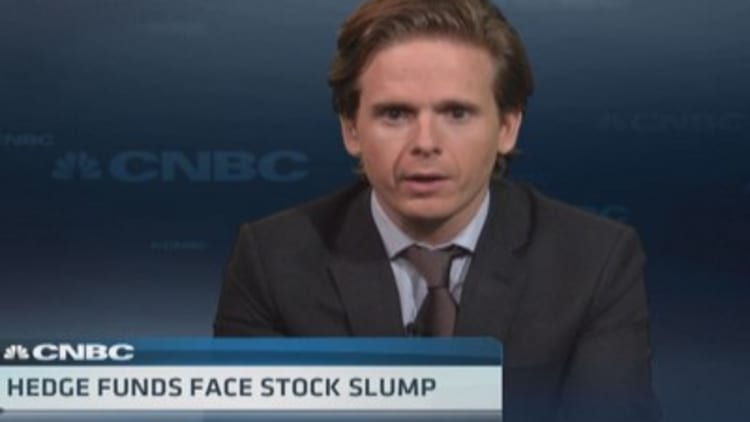
By the time last Friday afternoon was finally over, managers at even some of the most successful hedge funds felt like crawling into a hole.
While the S&P 500 declined only 2.6 percent last week, the move came as a shock for many on Wall Street, which had not been hit so hard since the summer of 2012.
The pain was far worse for those exposed to emerging markets, where many hedge funds have ventured in search of bigger returns. Stocks in Turkey, for instance, are down 15 percent in U.S. dollar terms so far this year and nearly 50 percent from their peak last May.
Even with markets looking calmer Monday morning, last week's rough ride reminded hedge funds of a challenge they haven't faced in some time: Generating positive returns in a losing market.
With the S&P 500 rising every year since 2009, it has been possible to generate decent returns without keeping up.
Take 2013. The HFRI Equity Hedge Index, which tracks stock-focused funds, rose 14.6 percent while the S&P 500 rose 29.6 percent. Similarly in 2012, the Equity Hedge Index gained 7.4 percent, compared with a 13.4 percent rise in the S&P 500.
Such a performance was probably enough to please many investors who have entrusted their money with hedge funds. The thinking is that hedge funds can deliver stable returns in any market, even if they lag a bit when stocks soar.
(Read more: Is P&G the right gamble in the selloff?
But the real test comes when markets swoon. While it helps to have short positions in place to protect against a broad selloff, funds still need to make some very smart bets to generate gains in a falling market. Just look at 2008, when the Equity Hedge Index fell 27 percent percent versus the 38 percent decline in the S&P 500.
The good news: Any panic selling could throw up opportunities. Indeed, some hedge funds say they would welcome a further selloff so they can buy stocks that have been on their shopping lists but remain too expensive.
But succeeding in a choppy market requires both the ability to pick good ideas and time them right. By the end of 2014, it may be clearer which funds have real talent.
Indeed, that could be a positive for investors who have placed their money with hedge funds and paid them handsome fees in the last few years. While the hedge fund industry slimmed down and fees fell after the financial crisis in 2008, assets under management have returned to record highs. It may not be the worst thing for investors in hedge funds to see managers put to another test.
—By CNBC's John Jannarone. Follow him on Twitter @jannarone

